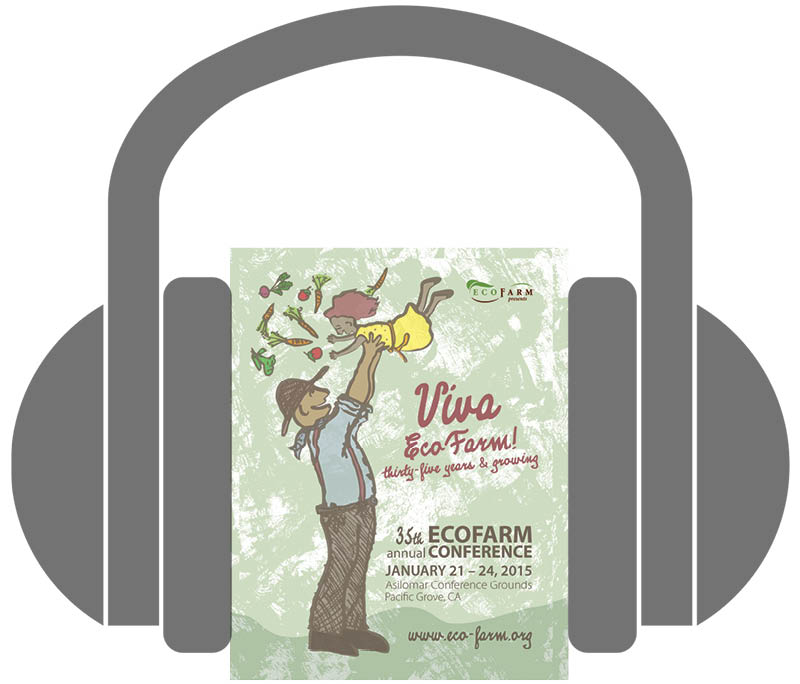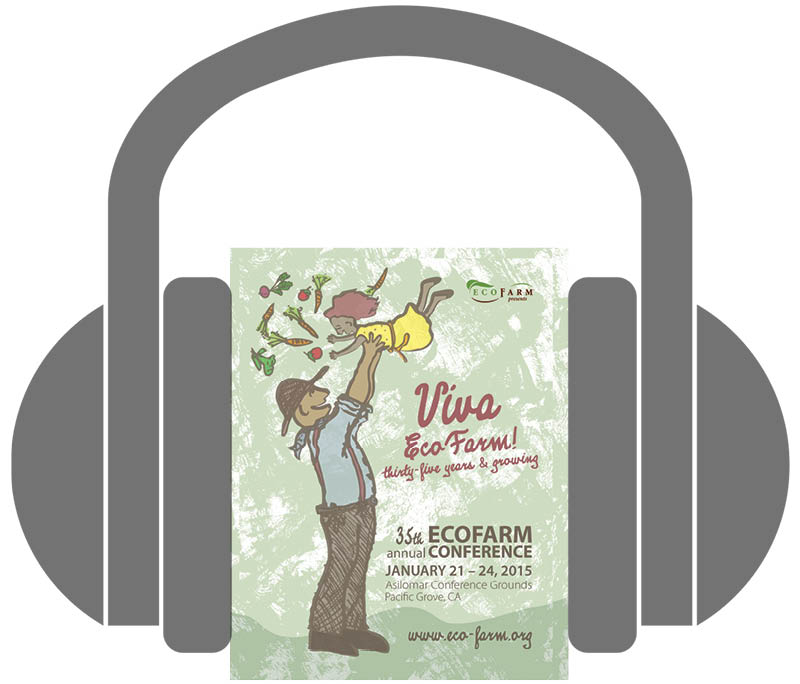
The 35th annual EcoFarm Conference was a lively gathering that brought together over 1,700 farmers, educators, students, speakers, exhibitors, activists, retailers, and distributors in the agriculture and food world to learn, share and discuss the health, viability and justice of our food and farming system.
The 35th anniversary was an important milestone for the community, and this year's conference included over 70 workshops and discussion groups covering topics ranging from water rights to climate change, and urban agriculture to Chinese medicinal herb production. EcoFarm also provided multiple platforms for networking and community building such as consultation opportunities aka Office Hours, where attendees could meet one-on-one with experts in marketing, food safety, journalism, and biodynamic agriculture. Events such as the Beginning Farmer & Rancher Mixer provided a space for emerging farmers to connect with elders and each other for support and mentorship.
Read on for more highlights and tell us what you thought. Fill out the EcoFarm Conference Evaluation by March 1st and get entered to win registration for EcoFarm 2016 with meals. And don't forget to mark your calendar - the next EcoFarm Conference is happening January 19 - 23, 2016!
Get your Audio and Video on! The 2015 EcoFarm workshop recordings and plenary videos are now available online.
Visit the EcoFarm shop to peruse the workshop MP3 recordings and download yours today. $1.99 per workshop with great discounts for buying in bulk. Videos of each Plenary can be watched (for free) on EcoFarm's YouTube channel.
Viva EcoFarm Photo Contest Winner
Congratulations to our 'Viva EcoFarm' photo contest winner - PCC Farmland Trust posted this photo on Instagram during the conference. Their Associate Director, Melissa Campbell and her son Calan while at Asilomar Beach, remind us with the help of The National Young Farmers Coalition that "Farming is Public Service!" Thanks to all who engaged in social media at the conference. You enriched the EcoFarm experience.

Did you order an EcoFarm t-shirt online before the conference?
If you didn't pick up your t-shirt please contact us!
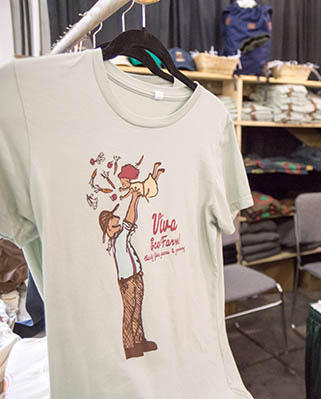
Stewards of Sustainable Agriculture and Advocate of Social Justice
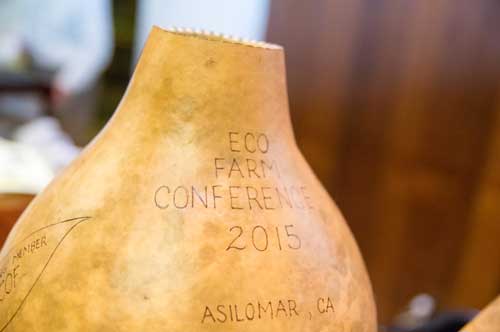
.The annual Awards Ceremony is a yearly highlight of EcoFarm. This year, the Stewards of Sustainable Agriculture Award, also known as the “Sustie" was awarded to Congressman Sam Farr, Wendy Krupnick, and Jerry & Jean Thomas of Thomas Family Farm. The Advocate of Social Justice Award aka "Justie" was awarded to Michael O'Gorman, founder of the Farmer Veteran Coalition. And the Golden Pliers award was given to Paul Muller of Full Belly Farm
Congressman Sam Farr
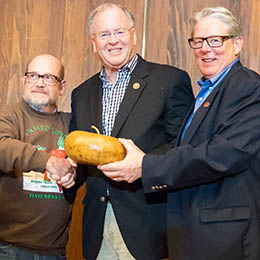
Photo by Trav Williams, Broken Banjo Photography
“Sam Farr has been a champion of organic and sustainable agriculture, year-in and year-out, for decades. He is deeply concerned with health effects of our food system, and fairness for all participants in it. He’s always there for us, a great public servant, and a true steward of sustainable agriculture," said Mark Lipson, a recent Organic and Sustainable Agriculture Policy Advisor at the USDA and a partner in the Molino Creek Farming Collective in Davenport who paid Farr tribute at the Awards Ceremony.
Early eco-farmers came knocking at Sam Farr's door at the California State Assembly back in the 1980s. They asked him to author legislation that would create a set of standards for organics. At the time, anyone could slap the word “organic” on their packaging as a marketing tool, no matter how the produce was grown. Farr rose to the challenge, authoring legislation which passed in 1990—the first in the nation.
When Farr went to Washington in 1993 as a congressman representing the Central Coast region, he continued to champion organics and other progressive initiatives, such as clean oceans, farmworker safety, and support for bicycling programs. He's been a supporter of programs such as the UCSC farm and garden. He authored legislation for organic food standards and agricultural research.
And he’s still going strong. Farr learned from his father, California State Senator Fred Farr, who sponsored a law requiring toilets in the fields for farm workers, as well as important environmental legislation.
Wendy Krupnick
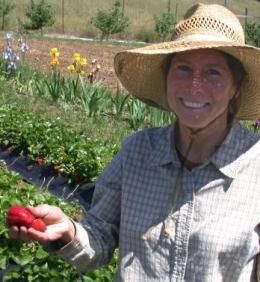 photo by Peter Lippman
photo by Peter Lippman
Since the 1980s, Wendy has touched so many lives in her incredibly varied career of farming and gardening. She organized and ran the Felton Farmer’s Market in Santa Cruz County for ten years. She participated in the California Certified Organic Farmers (CCOF) Central Coast Chapter and managed the trials garden at Shepherds Seed, now known as Renee’s Garden Seeds.
Wendy left her mark on Wood Leaf Farm, Star Route Farm, the Cascadian Demonstration Farm, the Santa Rosa Junior College organic farming training program and the Farm and Garden at UC Santa Cruz where she was an early apprentice back in 1976. She taught numerous classes for the Master Gardeners in Monterey Bay area, Santa Clara County, Marin County and also in Sonoma on fruit tree pruning, edible gardening and other topics.
Wendy's diverse gardening experiences are so varied. It is hard to imagine how she was able to cultivate in so many gardens. She was the garden manager at the Farallones Institute Garden before it became the Occidental Arts and Ecology Center, and the restaurant gardens for Jesse Cool’s Late for the Train and Flea Street Café. More recently, Wendy has been involved in Sonoma County where she created several new garden locations, is involved with the Community Garden Network of Sonoma County, IGROW Sonoma, the Department of Health Services, and the Sonoma County Food System Alliance. She worked with author Roz Creasy to create her book “The Complete Book of Edible Landscaping”.
"Wendy is without a doubt one of the most active volunteers you'll ever meet for countless causes like CCOF, the Multinational Exchange for Sustainable Agriculture (MESA), and the Ecological Farming Conference. She has left her inspiring footprints on so many beautiful gardens and has helped the food and farming movement in so many ways," said Thomas Wittman, of the Ecological Farming Association who presented Wendy's award.
Jerry and Jean Thomas, Thomas Family Farm
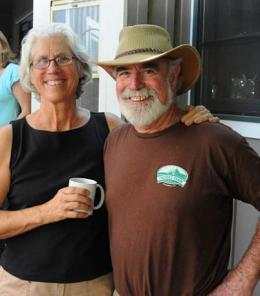 Photo by the Center for Urban Education about Sustainable Agriculture (CUESA)
Photo by the Center for Urban Education about Sustainable Agriculture (CUESA)
Organic farming was only a whisper of an idea when Jerry and Jean Thomas drove from Southern California to the Central Coast in the late 1960s. Part of the back-to-land movement, they strapped all their belongings to the roof of their Volkswagen Bug and headed north. When they reached a picturesque park in Santa Cruz, they decided they’d gone far enough. They knew they wanted to get away from urban sprawl and lead a more rural way of life—and Santa Cruz County seemed like the place to do it. What they didn’t know was that they were about to become fundamental in launching the Central Coast’s organic farming movement.
The couple began looking for farmable land, finally coming across five fertile acres on Pleasant Valley Road in Corralitos. Since it was an apple orchard at the time, they started with apples. Soon, they were growing tomatoes. Before too long they’d planted sunflowers, statice and strawflowers. All their crops were grown sustainably, with no chemical pesticides or fertilizers. Taking care of the land was just as important to them as harvesting the fruits, flowers and vegetables that came from it.
Though people seemed eager to buy the crops he grew, Jerry realized it was difficult to find places to sell the crops. He had a vision of farmers’ markets as the best way to get his fresh produce and flowers directly in the hands of potential customers. So he got together with five other local organic growers and founded California Certified Organic Farmers (CCOF), an organic certification and trade organization. Soon after, they started the first farmers’ market in Santa Cruz, which began at Live Oak Elementary School, and later moved to become the Cabrillo College Farmers’ Market. The organic food movement quickly caught on as farmers' markets sprung up throughout the Monterey Bay region.
Thomas Farm also became a leader in establishing a market for organic cut flowers, new territory for organic growers. Although many customers are primarily concerned with pesticides on food, the cut flower industry imposes a heavy chemical burden on the planet. “Pesticide residue regulations for conventional flowers are not as stringent as those for food, so there’s no telling what’s on them,” says Jerry. The farm became known for their diversity of pesticide-free dahlias, tulips, sunflowers, and other specialty cut flowers.
Today, Jerry and Jean's son, Josh and his wife Kari run Thomas Farm, with their four children growing up alongside the summer squash and blooming dahlias. The kids already follow the family tradition, selling cut flowers alongside the country road they live on. And though farmers’ markets continue to be their favorite venue (they sell at numerous farmers’ markets throughout Santa Cruz County and the Greater Monterey Bay and San Francisco Bay areas), they also sell their goods to retail stores and operate a CSA.
Michael O'Gorman
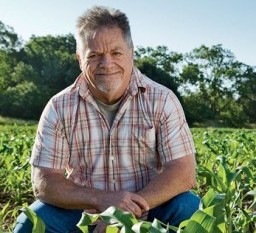 Michael O'Gorman began farming organically in the early 1960's. In all he has done over the years, what he is most humbly proud of is the 20 years of being the farm manager - that "back of the house, unsung hero of farmers" like TKO, Mission Organics, Earthbound and Jacob's Farm.
Michael O'Gorman began farming organically in the early 1960's. In all he has done over the years, what he is most humbly proud of is the 20 years of being the farm manager - that "back of the house, unsung hero of farmers" like TKO, Mission Organics, Earthbound and Jacob's Farm.
In 2008, Michael started the Farmer Veteran Coalition out of the back of his pick-up truck. The mission of this organization is to mobilize veterans to feed America. The organization is truly "turning swords into plowshares" said Jesse Cool of the Ecological Farming Association who presented Michael with his Justie award.
For Michael, the endeavor of Farmer Veteran Coalition was yet another way of being a good citizen. He wanted to give back to those who fought in wars to protect us, those who often come back home lost, damaged, unsupported and in need of healing and love.
Michael, his staff and board of directors have accomplished this mission in so many ways. They hold a national conference, resources for farmer veterans such as business contacts, funding routes, food and farming contacts and educational and training opportunities. The Farmer Veteran Coalition not only acknowledges the contribution of veterans but also provides community and a place here at home where they can find peace and fulfilment.
Other News from EcoFarm and its Partners
The Drought Fighter - Could a controversial farmer in California have found the most effective way to grow food in a warming world?
Get the dirt on what Paul Kaiser from Singing Frogs Farm is up to on his 8 acre operation in Sebastopol, California, covered by author Todd Oppenheimer of Craftmanship Magazine. Paul Kaiser presented the "No-Till Vegetable Production for the Future" workshop at the 2015 EcoFarm Conference. If you missed, it, be sure to download the audio recording by visiting the EcoFarm Shop.
Free Webinar: New Strategies for Battling GMOs
GMO labeling initiatives in California and Washington lost narrowly in 2014 thanks to millions of dollars spent by Big Ag and Big Food to distort the truth. But these companies are tired of fighting state labeling initiatives—the push is on to create a federal law that would prohibit state labeling laws. So what can the rest of us do to ensure access to the information we need to make healthy food choices? Join Bioneers for a free webinar on February 26th, 2015 at 11am PT and learn about practical tips and ways you can take action to remove GMOs from our food supply. Featured guest John Roulac, founder of Nutiva and GMO Inside, will join Arty Mangan, Director of the Restorative Food Systems program at Bioneers, to reveal strategies, challenges and successes in getting companies like General Mills to eliminate GMOs from Cheerios. Register here.
Food Policy Database
On October 20, 2014, Growing Food Connections announced the launch of a new searchable database containing enacted local government food policies. The Growing Food Connections Policy Database includes over 100 policies governing issues as diverse as public investment in food systems, farmland protection, local food procurement and food policy council resolutions. For more information, view the press release. Growing Food Connections is looking for additional, innovative food policies to add to the database. If you would like to submit a policy for potential inclusion in the database, please take a minute to fill out this form. Only policies that have been officially adopted by a local government (municipality or county) will be considered. Submissions from countries beyond the United States are welcome.
Cut Flower Growers' Intensive
The Association of Specialty Cut Flower Growers is holding their Growers' Intensive from March 23 - 24, in San Jose, CA. Cut flower peonies, organic production, South African and Australian species, soils and irrigation, perspectives from new and not-so-new cut flower growers - it's a great mixed bag of sessions with something for everyone. Speaker sessions are Monday, March 23, Tours on Tuesday the 24. Check out the full program and register here.
Tell USDA to Support Stronger Conservation of Biodiversity in Organic Agriculture!
Help make sure the National Organic Program gets its biodiversity conservation guidance right! Currently, there is a loophole for allowing thousands of acres of native prairie, old growth forest or other natural ecosystems to be converted to agriculture and organically certified the next day. Land that has not been plowed or previously planted is an easy target for those looking to quickly overcome NOP’s three-year waiting period, and that needs to change. The National Organic Program is accepting public comment on the Draft Guidance: Natural Resources and Biodiversity Conservation for Certified Organic Operations until Friday, February 27th, 2015. Submit your comments on the Natural Resources and Biodiversity Conservation Guidance: Docket Number-AMS-NOP-14-0062. If you need help, see instructions on how to do that.
Tell Your Story - Sell Your Products: Bay Area Market Tour for Farmers
Are you interested in selling your produce to wholesale buyers but not sure how? The produce distribution industry is mobilizing to meet consumer demand to “know your farmer” and needs well-prepared farmers to work with. Join us on a tour of wholesale markets, retailers, and food hubs to meet buyers interested in supporting small farms. You'll make valuable contacts, learn the requirements for wholesale-ready sales, and learn how to help your story travel with your products all the way from farm to fork. Tuesday, February 24 for Bay Area farmers. More details at http://ucanr.org/bustour. Event hosted by UC SAREP and UC Cooperative Extension
Federal government to boost drought funding by $50 million, with the largest portion earmarked for California.
The additional funding includes about $20 million for the Central Valley Water Project for efforts such as water transfers, drought monitoring for endangered species and diversifying water supplies. California is entering its fourth year of drought. California is only delivering 15 percent of the water requested from the state's vast reservoir system to farmers and local agencies this year. The Interior Department will announce how much water it will send to Central Valley farmers under a separate reservoir system later this month. "Do Farmers and Water Districts Really Have Water Rights" was a workshop at the 2015 EcoFarm Conference. You can download it by visiting the EcoFarm website's shop.
USDA announces more than $9 million to help farmers and ranchers who are veterans and/or socially disadvantaged
This USDA funding will enable community-based organizations, eligible higher education institutions and tribal organizations to work directly with these groups to successfully acquire, own and operate farms and ranches and to access all USDA programs and services. Applications for the 2501 program must be submitted through www.grants.gov. More information about the 2501 Program, including forthcoming grant notice and application deadlines is available here.

